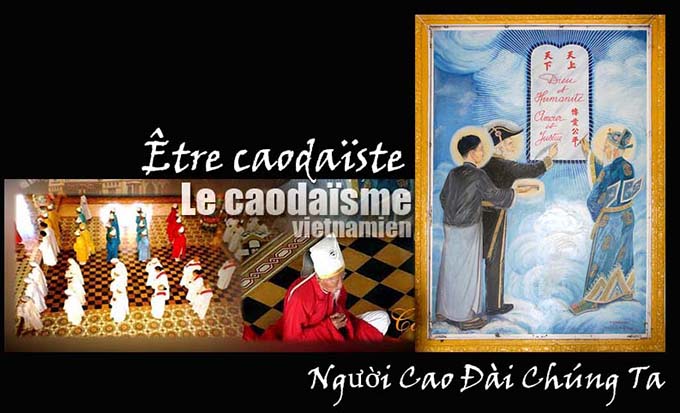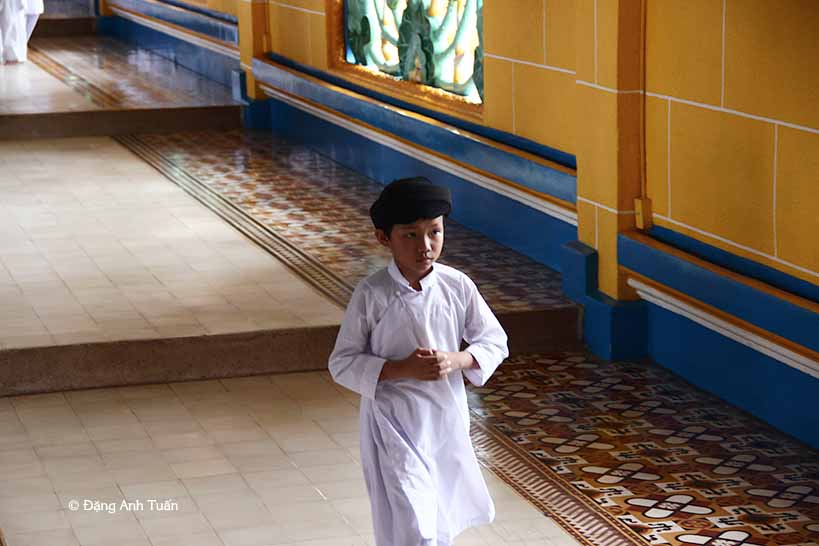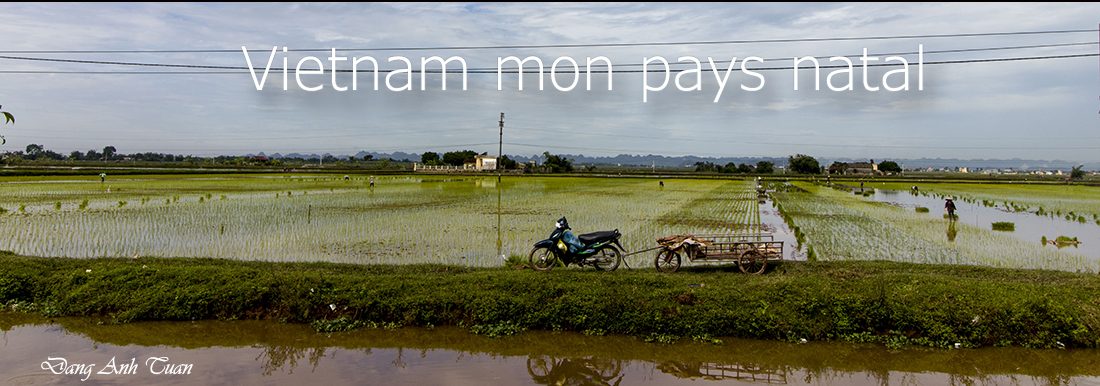
We, the Caodaïsts, we must know to perfect ourselves. It is not essential for us to fast and call upon Buddha by prayers or to enter a pagoda in order to be able to attain perfection. We have the possibility of attaining it if we always have in us the three following qualities: Love, Wisdom and Will.
At birth, we already had kindness. This is why, our Ancestors were accustomed to saying:
Nhân chi sơ, tính bản thiện. Mankind is naturally good at birth.
But because of the hazards of life, the unjustified competitions and the immoderate desires which continue to monopolize us sempiternally, we thus became dishonest people, perfidious, egoistic, which makes us lose the kindness that we acquired at birth. All the Wise ones of Antiquity had had these three qualities evoked above.
To have an idea on what the individual has or not in terms of kindness, it is enough for us to observe his behavior towards his close relations. It is by this observation that we are able to know him, which had said the Chinese philosopher Jou Mencius.
Love is a quality necessary to the perfection but it cannot be complete because we need wisdom to distinguish truth from falsehood, right from wrong, good from evil. There are plenty of generous people who, in spite of their gifts offered to the construction of the pagodas in a considerable way, continue to be entangled in an inauspicious behavior because they do not manage to distinguish right from wrong. It happens that they may be badly considered sometimes compared to those who never have the occasion to take part in this generous contribution.
In Vietnam, the Lý dynasty was famous for its irreproachable enthusiasm towards Buddhism by the bias of a great number of constructions of pagodas. That unrelentingly led the people to misery because of the too high taxes and ineluctably caused the popular discontent which was the principal cause of its fall.
Whatever his educational level, man always has in him Wisdom because when we act badly or not, we will know it thanks to our own conscience. For example, when one tries to lie, one feels ashamed towards oneself although the person to whom one lied does not know it. It is the wisdom which helps us make this distinction. The French philosopher Blaise Pascal had the occasion to stress that man is a thinking reed.
To continue to lie or act badly or not, we need Will. It is easy to evoke this quality but it appears difficult for us to have it because we are obliged to go sometimes against our own interests or to be losers at times also. Sometimes it happens to us not to have a safe life. I refer to some Chinese or Vietnamese historical facts with an aim of enabling us to be together to reflect and respectfully admire the people whom I regard as knowing how to perfect themselves because they had the three qualities evoked above. They became famous characters in the history of China and Vietnam.
Initially, it was the case of Zhuge Liang ( or Gia Cát Lượng in Vietnamese). He was at the same time Prime Minister and adviser to Liu Bei, the last survivor of the Han dynasty ( Lưu Hoài Ðức ) in China. The Barbarians coming from the steppes of the North of China and directed by Manh Hoạch often liked to raid the territory of his kingdom. Zhuge Liang managed to capture Manh Hoạch 7 times but this latter was released immediately on the order of Zhuge Liang at each capture. He was very generous. He was equipped with an extraordinary wisdom because he found that it was necessary to convince Manh Hoach by the means of love and feelings. If Manh Hoạch had been killed, there would be probably another Manh Hoạch. That obliged him to frequently assemble punitive expeditions and did not allow him to have the free hand to restore the Han dynasty and to bring back peace and happiness to its citizens.
It was why he continued to release impassively Manh Hoach at the time of each capture. He had an incommensurable will because he knew that to prevent Manh Hoach from betraying later, he was to waste much time, to forget the personal interests and to give himself many concerns with his rather advanced age. It would be less tiring for him if he decided to kill Manh Hoach because he was not obliged to assemble up to 7 times the punitive expedition. At the time of the last capture, when he was about to usually release Manh Hoach, this latter started to cry and to surrender definitively. Zhuge Liang had these three qualities evoked above. Although he is not a monk, we can affirm that with the three qualities found in him ( Love, Wisdom and Will ), he knew how to perfect himself and he was already regarded as a Wise one at the time of the Three Kingdoms.
In Vietnam, there are also kings whom we can regard as the Wise ones. It is the case of king Lý Thánh Tôn which had these 3 qualities quoted above. This is why he was known in the history of Vietnam as an intelligent king, distinguished, charitable and valiant. The revolt of the king of Champa, Chế Cũ obliged him to assemble a punitive expedition while leaving regency to his concubine Ỷ Lan. Faced with the determination of Chế Cũ, he was not able to capture him after several months of expedition. Disappointed, he was obliged to return to the country. On his return, he learned that his people did not cease praising the talent of his concubine Ỷ Lan in the art of governing the country. He felt ashamed and decided to return to the front. When he succeeded to capture Chế Cũ, he could have killed this one to alleviate his anger but he preferred to let him return to his country.
It was why Viet-Nam knew a period of peace, prosperity and happiness. He was very charitable because he let the one who had humiliated him in front of his people leave. He lost much time in order to be able to capture him. Are we capable of acting as he did if we were in his place? One fine day, during one period when the winter was hard, he addressed his mandarins in the following terms:
By dressing myself in this manner, I continue to be stiff with cold. How do people manage to resist this rigorous cold especially the poor when it is known that they do not have enough money to feed themselves?. It is necessary to give them as of now additional food and clothes.
Another time, while holding company with his daughter, the princess Ðông Thiên, at the time of an audience, he turned to his mandarins in saying to them:
I have a deep love for my people as that which I always have for my daughter. Unfortunately, the people is so little informed that it does not cease to make mistakes. It is for that that I have so much pity for it. I kindly request you to decrease the punishments and the pains inflicted.
His wisdom was incommensurable. To conquer Champa, he knew that it was necessary to convince and calm Chế Cũ although he was humiliated and upset to compare what he had undergone to what his concubine had done, a woman coming from a rural environment, Y? Lan for his people during his absence. He could kill Chế Cũ to alleviate his anger and to wash this momentary insult. But he was a courageous man who could put the interests of his people before his personal interests. He was really the person having the three evoked qualities.
Whatever the situation we are in, we, Caodaïsts, we must try to improve ourselves. That sometimes happened to me to want to continue this step. It is necessary to recognize that it is not easy to concretize it. I do not hide either that I had also the daily difficulties but I feel relieved enormously when I succeeded in concretizing it a little. I am delighted because I realize that I start to improve myself even if that appears negligible.

A young Caodaïst
That reminds me of the sentence that Ung Giả Vi wrote in the Conversations of Wise Confucius:
Nhân viên hồ tai! Ngã dục nhân, Tư Nhân chi hỷ!
Nhân có xa đâu! Ta muốn nhân thì nhân đến vậy!
The virtue is not far! One will be able to have it if one really wants it.
that enables me to be convinced that GOOD or EVIL exists well in each one of us. I understand that it is not necessary to go to the pagoda or the church to be able to improve oneself. I am able to do it if I do not forget what God in the bible of the Caodaïsts said that I had the occasion to read:
If you want to be a true Caodaïst, it is necessary that you have Love and the moral principle. It is absolutely necessary for you to improve yourself.
You merit to thus wear this white tunic, symbol of purity. You feel more than ever proud to be a Caodaïst.
